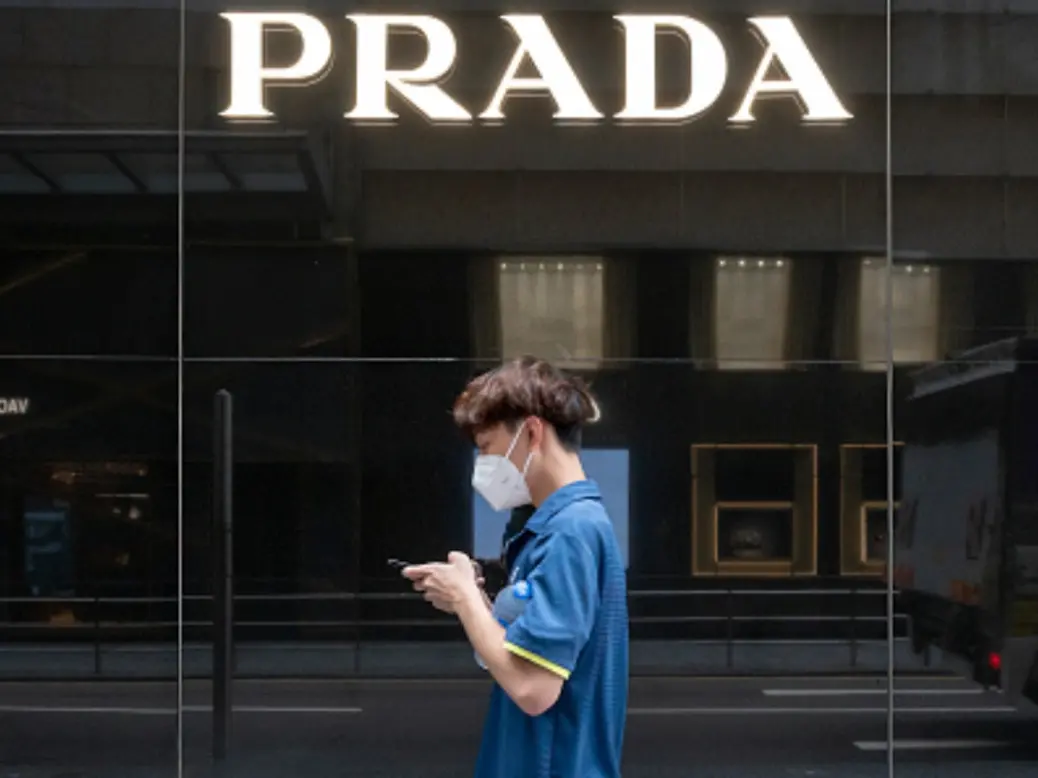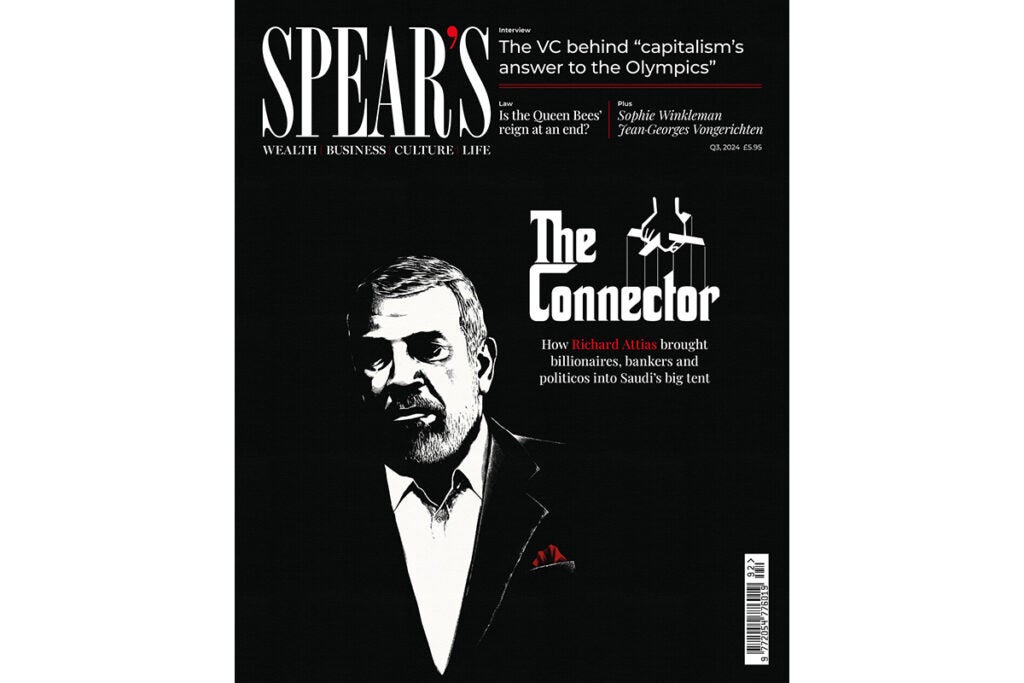
The brand-new fashion boutiques in Beijing’s SKP mall look even shinier than those on Bond Street, Avenue Montaigne or Madison Avenue. Assistants clad in black cashmere dust, arrange and rearrange the cabinets displaying the new autumn/winter collections. The only detail tarnishing the chic tableau? An almost total absence of customers. Gucci and Burberry are so quiet I feel like I am intruding on private grief.
But at least the mall is still open. Late last year Harvey Nichols announced it would be closing one of its two stores in downtown Hong Kong. ‘Chinese tourists coming to Hong Kong are no longer as focused on shopping as they used to be before the pandemic,’ Dickson Concepts, Harvey Nichols’ operating company, explained in a note to investors.
China, the engine of the $250 billion-a-year global fashion industry, is sputtering. Erwan Rambourg, global head of consumer and retail research at HSBC, ‘was expecting to hear horror stories’ when he recently toured China. He was not disappointed. ‘It was terrible.’
Terrible is the right word to describe many of the latest sales figures from the world’s biggest labels. Most brands saw double-digit sales declines in China year-on-year in the first quarter. Worst hit is French luxury goods group Kering. It saw $9 billion wiped off its market value in March after sales slumped nearly 20 per cent, largely due to falling demand in Asia for its powerhouse brand, Gucci. To many Chinese customers, the muted collections by Gucci’s new designer Sabato de Sarno – which follow the maximalist ‘geek chic’ of his predecessor, Alessandro Michele – are, as one shopper in SKP mall put it, ‘too much like other Italian brands’.
Few luxury goods are more exposed to changes in Chinese consumer sentiment than Swiss watches. Exports to China plunged by 25 per cent in February compared with last year, the Federation of the Swiss Watch Industry reports. ‘There is a slowdown,’ concedes Nick Hayek, the chief executive officer of Swatch Group, whose brands include Omega and Tissot. China accounted for a third of the company’s sales in 2023.
The slump at home has not been mitigated by wealthy Chinese tourists shopping in Paris, London, New York and Singapore. Store managers in those cities describe many Chinese visitors as ‘unqualified shoppers’ – a pejorative for low-income consumers. The result, says Luca Solca, leading luxury analyst at Bernstein, is that Chinese consumers worldwide now account for a quarter or less of global luxury spending – a large fall from a third in 2019.
[See also: China’s insatiable appetite for luxury should reassure investors]
Fashion remains fashion, of course, so not all brands are suffering. Some have nailed the right look and the right social media messaging. Sales at Miu Miu, Prada’s irreverent little sister, are up by almost 50 per cent in China this year as consumers fall for its ‘rebel college girl’ chic. ‘Everyone I met in Shanghai and Hong Kong was completely obsessed with the new product and the new logo,’ says Rambourg.
Other labels are so high-end that they continue to attract super-rich consumers who remain relatively unaffected by changing tastes or economic pressures, notably Hermès, Loro Piana, Brunello Cucinelli and Zegna. Hermès sales in China jumped 17 per cent to €3.8 billion ($4.1 billion) in the first quarter.
China has been a one-way bet for most luxury brands for almost two decades. Economic growth drove such an appetite for luxury that, as Solca puts it, ‘all boats rose’. What’s gone wrong?
China’s economy is in the doldrums by its fizzy standards. The property sector, which accounts for around a quarter of China’s GDP, is teetering. Unemployment among young people hit record highs last year after a regulatory crackdown on tech and education firms, which had been big employers of millennials and Gen-Z. Big debts are crippling many households. ‘Consumers do not feel confident about their economic future, so are not in the mood to spend much, especially not on watches and handbags,’ says Solca.
The political crackdown in Hong Kong has sparked an exodus of wealthy residents, who have moved to Singapore, London or New York. Trade and geopolitical tensions between Beijing and Washington have roiled sentiment – and caused headaches for luxury brands. In January the Chinese government launched an anti-dumping investigation into cognac imported from the European Union. The move was widely interpreted as retaliation for Brussels’ decision to open its own investigation into China’s subsidies for electric vehicle makers.
Some brands have made things worse for themselves by deciding to cash in on the pandemic-induced explosion in demand by jacking up prices. The average price of luxury goods has increased by 52 per cent since 2019, according to HSBC. Some brands have doubled prices. Rambourg identifies Burberry, Chanel and Saint Laurent as among those that have ‘priced out the aspirational customer’. He explains: ‘The Chinese consumer is much savvier and better-informed about product, quality and price than ever before. They walk into a store, they look at the price tag, and they say, “Nope, I’m not paying those prices,” and they walk out.’

Chinese retailers and the government have also played a part. Western brands used to have the fashion market to themselves. Now homegrown Chinese brands are gaining traction among consumers. Shang Xia, Icicle, Bosideng and Songmont are growing fast. Icicle, Bosideng and Songmont are mid-market labels, which makes them attractive at a time when the government is cracking down on ostentatious displays of wealth. Social media influencers who showed off their lavish lifestyles have been banned from Chinese platforms. ‘Once materialism starts spreading, it can have a bad influence on teenagers. This trend of luxury on the internet needs to be stopped,’ state media said.
How are luxury brands reacting to the slowdown? Some are reconsidering their Asia strategy and looking beyond China for future growth, says Angelito Perez Tan, co-founder and CEO of research outfit RTG Group Asia. ‘India, Southeast Asia and the Middle East are seen as having great potential,’ he says. ‘Executives know they can’t put all their eggs into one basket any more.’
Others are confident that demand in China will return. They point out that luxury spending is still growing, just not as fast as in recent years. A recent report by McKinsey and Business of Fashion predicts growth of around 4 per cent this year. The Chinese market certainly has room to expand. Chinese shoppers spent $50 per capita on luxury goods in 2022, according to Morgan Stanley. That compares with $280 in the US and $325 in South Korea. China bulls add that Beijing is eager to gin up demand – albeit in a controlled way. Ministers are turning Hainan, a tropical island province roughly the size of Belgium in China’s deepest south, into the world’s largest duty-free shopping zone.
For Laurent Boillot, chief executive of Hennessy cognac – the H in LVMH – there is no alternative to the Chinese market. ‘I get asked all the time the question: what’s after China? My answer all the time is: after China, there is China.’
This feature was first published in Spear’s Magazine Issue 92. Click here to subscribe







